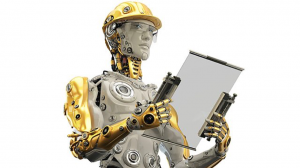 A report from City leeches PwC, suggests that over ten million British workers will find themselves replaced by robots in the next 15 years, with 30% of jobs under threat from strides in artificial intelligence. The wholesale and retail sector could lose 2.25 million jobs, along with 1.2 million in manufacturing and 950,000 in transport and storage. PwC’s chief economist, John Hawksworth, tries to sweeten the pill by suggesting that, whilst automation “will eliminate some existing jobs” it may also “enable some workers to focus on higher value, more rewarding and creative work, removing the monotony from our day jobs” (quoted by Larry Elliott, ‘Millions of UK workers at risk of being replaced by robots’, The Guardian, 24 March 2017). Under a planned socialist economy, where every advance in productivity lessens the drudgery of work and gives free rein to workers’ creativity, this would be true. Under the anarchy of capitalist overproduction, however, no such rosy prospect opens up.
A report from City leeches PwC, suggests that over ten million British workers will find themselves replaced by robots in the next 15 years, with 30% of jobs under threat from strides in artificial intelligence. The wholesale and retail sector could lose 2.25 million jobs, along with 1.2 million in manufacturing and 950,000 in transport and storage. PwC’s chief economist, John Hawksworth, tries to sweeten the pill by suggesting that, whilst automation “will eliminate some existing jobs” it may also “enable some workers to focus on higher value, more rewarding and creative work, removing the monotony from our day jobs” (quoted by Larry Elliott, ‘Millions of UK workers at risk of being replaced by robots’, The Guardian, 24 March 2017). Under a planned socialist economy, where every advance in productivity lessens the drudgery of work and gives free rein to workers’ creativity, this would be true. Under the anarchy of capitalist overproduction, however, no such rosy prospect opens up.
Hawksworth claims that “By boosting productivity – a key UK weakness over the past decade – and so generating wealth, advances in robotics and AI should also create additional jobs in less automatable parts of the economy as this extra wealth is spent or invested.” This ignores the fact that surplus value (“extra wealth”) owes its existence exclusively to the exploitation of living labour in the process of capitalist commodity production. This means that the more that living labour is supplanted by the application of technology, the narrower becomes the scope for the generation of surplus value. Under capitalism, the boon of productive development appears as a curse.
It is a curse for workers because every advance in productivity, by cheapening those daily necessities upon whose consumption the worker depends in order to bring his labour power to market, brings in its train a constant downward pressure on his real wages (if he is lucky enough to retain a job, that is). Yet in the end it is a curse for the capitalist too, as the shrinking role of living labour in capitalist commodity production reduces ever further the relative scope for the generation of surplus value. But the capitalist cannot get off the treadmill, and must strive to steal a march on his market rivals by further raising productivity, bringing the productive forces into ever sharper contradiction with the relations of production. Only the socialisation of the means of production through proletarian revolution can resolve this contradiction, taking the fetters off the productive forces.
Comments are closed, but trackbacks and pingbacks are open.